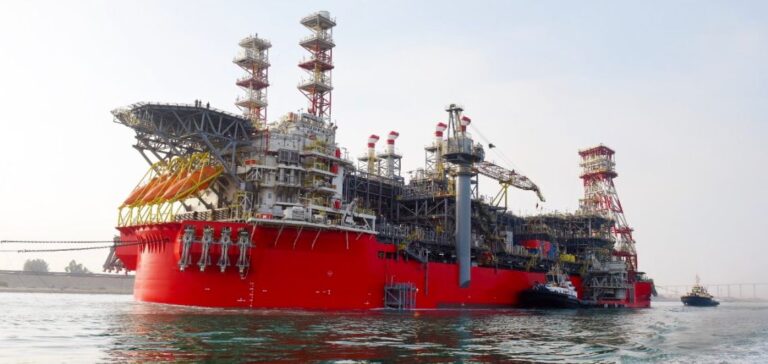Against the backdrop of intense diplomatic negotiations to determine its maritime border with neighboring Lebanon, Israel is preparing to activate the Karish offshore gas field, a key step to boost its natural gas exports to Europe.
Lebanon and Israel, neighboring countries officially in a state of war, have been negotiating for two years through the United States to delimit their maritime border and remove obstacles to hydrocarbon exploration on a controversial offshore field in the eastern Mediterranean.
Israel considers that the Karish deposit is located in its exclusive economic zone, but for Lebanon it is in disputed waters.
The arrival in June in Karish of a ship chartered by the company Energean Plc, which was supposed to extract gas on behalf of the Jewish state, had exacerbated tensions and prompted Lebanon to call for a resumption of negotiations, which had been suspended following disputes over the surface of the disputed area.
Hezbollah, which dominates political life in Lebanon, has repeatedly warned Israel against any activity in Karish without an agreement on the maritime border. And in early July, the Israeli army intercepted observation drones sent by the armed movement to the deposit.
Talks between Lebanon and Israel have intensified in recent weeks with visits to both countries by the American mediator Amos Hochstein.
On September 8, Energean said it was ready to start producing gas “in a few weeks” for Israel, where the government said it would begin connecting the gas field to its national grid. Karish should also enable Israel to increase gas deliveries to Europe.
“We will be part of the effort to replace Russian gas in Europe,” Prime Minister Yair Lapid said last week in Berlin, adding that Israel planned to supply Europe with “10%” of what Russia used to supply it with, before its invasion of Ukraine on February 24.
Moscow had supplied in 2021 some 155 billion m3 of gas to the countries of the European Union. Thus, 10% would amount to 15.5 billion m3.
Get out the calculator!
Israel already delivers gas to its neighbors Jordan and Egypt, and in June signed an agreement to liquefy its gas in Egypt for shipment to Europe.
Israel’s two offshore fields of Leviathan and Tamar produce a total of 23 billion m3 of natural gas annually.
But as Israeli domestic consumption is 13 billion cubic meters and the agreements with Jordan and Egypt are around 9.5 billion cubic meters, this leaves little gas available for the European market, explains Gina Cohen, a specialist in the Israeli gas sector to AFP.
“To sell more gas to Europe, we need stable production from the Karish field,” whose short-term capacity is six billion cubic meters per year, she said, blaming the government for not acting quickly enough on these issues.
Production in Karish (north) is expected to supply the Israeli domestic market and to increase exports from the Leviathan and Tamar platforms, linked to the southern city of Ashdod.
However, the pipeline linking this city to the Israel-Egypt undersea gas pipeline is still to be expanded in mid-2023. And to make up the 10% of former Russian sales, production from the Tamar and Leviathan fields will also have to jump in the coming years.
Tensions, attention
But as Egypt’s liquefaction capacity is not infinite, the Hebrew state will also have to find other options to bring its gas to Europe, such as an Israel-Cyprus-Turkey or Israel-Cyprus-Greece pipeline, or even develop its own liquefied gas terminals, analysts say.
In the meantime, Hezbollah has warned against any production in Karish before an agreement on the maritime border between Lebanon and Israel.
But “Karish is not part of the negotiations and production will start as soon as possible,” the Israeli prime minister’s spokesman said late Monday night.
For former Israeli Brigadier General Amir Avivi, there is a risk of tension, even if both sides are seeking stability for gas production.
“Hezbollah is using the Karish issue and the maritime border to show that it has Lebanon’s interests at heart,” he said. And if there is an agreement, “he will be able to tell (the Lebanese) that he pushed Israel to make concessions.






















